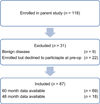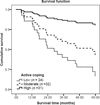Psychosocial factors and mortality in women with early stage endometrial cancer
- PMID: 24152380
- PMCID: PMC4061273
- DOI: 10.1111/bjhp.12070
Psychosocial factors and mortality in women with early stage endometrial cancer
Abstract
Objectives: Psychosocial factors have previously been linked with survival and mortality in cancer populations. Little evidence is available about the relationship between these factors and outcomes in gynaecologic cancer populations, particularly endometrial cancer, the fourth most common cancer among women. This study examined the relationship between several psychosocial factors prior to surgical resection and risk of all-cause mortality in women with endometrial cancer.
Design: The study utilized a non-experimental, longitudinal design.
Methods: Participants were 87 women (Mage = 60.69 years, SDage = 9.12 years) who were diagnosed with T1N0-T3N2 endometrial cancer and subsequently underwent surgery. Participants provided psychosocial data immediately prior to surgery. Survival statuses 4-5 years post-diagnoses were abstracted via medical record review. Cox regression was employed for the survival analysis.
Results: Of the 87 women in this sample, 21 women died during the 4- to 5-year follow-up. Adjusting for age, presence of regional disease and medical comorbidity severity (known biomedical prognostic factors), greater use of an active coping style prior to surgery was significantly associated with a lower probability of all-cause mortality, hazard ratio (HR) = 0.78, p = .04. Life stress, depressive symptoms, use of self-distraction coping, receipt of emotional support and endometrial cancer quality of life prior to surgery were not significantly associated with all-cause mortality 4-5 years following diagnosis.
Conclusions: Greater use of active coping prior to surgery for suspected endometrial cancer is associated with lower probability of all-cause mortality 4-5 years post-surgery. Future research should attempt to replicate these relationships in a larger and more representative sample and examine potential behavioural and neuroendocrine/immune mediators of this relationship.
Statement of contribution: What is already known on this subject? Psychosocial factors have previously been linked with clinical outcomes in a variety of cancer populations. With regards to gynecologic cancer, the majority of the research has been conducted in ovarian cancer and examines the protective role of social support in mortality outcomes. What does this study add? Demonstrates association between active coping during perioperative period and 5 year survival. Demonstrates psychosocial-survival relationship exists independent of biobehavioral factors.
Keywords: active coping; clinical outcomes; endometrial cancer; mortality.
© 2013 The British Psychological Society.
Conflict of interest statement
The authors indicated no potential conflicts of interest.
Figures


Similar articles
-
The psychosocial experiences of women with breast cancer across the lifespan: a systematic review protocol.JBI Database System Rev Implement Rep. 2015 Jan;13(1):112-21. doi: 10.11124/jbisrir-2015-1795. JBI Database System Rev Implement Rep. 2015. PMID: 26447012
-
Survival implications of time to surgical treatment of endometrial cancers.Am J Obstet Gynecol. 2017 Mar;216(3):268.e1-268.e18. doi: 10.1016/j.ajog.2016.11.1050. Epub 2016 Dec 9. Am J Obstet Gynecol. 2017. PMID: 27939327
-
Needs and priorities of women with endometrial and cervical cancer.J Psychosom Obstet Gynaecol. 2015;36(3):122-32. doi: 10.3109/0167482X.2015.1059417. Epub 2015 Jun 30. J Psychosom Obstet Gynaecol. 2015. PMID: 26123123
-
Predicting positive and negative impacts of cancer among long-term endometrial cancer survivors.Psychooncology. 2013 Sep;22(9):1963-71. doi: 10.1002/pon.3236. Epub 2012 Dec 12. Psychooncology. 2013. PMID: 23239462
-
Survival after a nationwide introduction of robotic surgery in women with early-stage endometrial cancer: a population-based prospective cohort study.Eur J Cancer. 2019 Mar;109:1-11. doi: 10.1016/j.ejca.2018.12.004. Epub 2019 Jan 14. Eur J Cancer. 2019. PMID: 30654224
Cited by
-
Symposium on advances in endometrial cancer epidemiology and biology.Gynecol Oncol. 2015 Sep;138(3):497-500. doi: 10.1016/j.ygyno.2015.07.106. Epub 2015 Jul 29. Gynecol Oncol. 2015. PMID: 26232339 Free PMC article. No abstract available.
-
Concomitant psychiatric symptoms and impaired quality of life in women with cervical cancer: a critical review.Int J Womens Health. 2017 Oct 30;9:795-805. doi: 10.2147/IJWH.S143368. eCollection 2017. Int J Womens Health. 2017. PMID: 29133983 Free PMC article. Review.
-
Evaluation of Patient-Reported Symptoms and Functioning after Treatment for Endometrial Cancer.Curr Oncol. 2022 Jul 22;29(8):5213-5222. doi: 10.3390/curroncol29080414. Curr Oncol. 2022. PMID: 35892983 Free PMC article.
-
ENhAncing Lifestyle Behaviors in EndometriaL CancEr (ENABLE): A Pilot Randomized Controlled Trial.Integr Cancer Ther. 2022 Jan-Dec;21:15347354211069885. doi: 10.1177/15347354211069885. Integr Cancer Ther. 2022. PMID: 35045735 Free PMC article. Clinical Trial.
-
When experiencing a surgery: Gastrointestinal cancer patients' longitudinal trajectories in psychological stress and their association with quality of recovery.Asia Pac J Oncol Nurs. 2022 Apr 11;9(6):100064. doi: 10.1016/j.apjon.2022.04.003. eCollection 2022 Jun. Asia Pac J Oncol Nurs. 2022. PMID: 35615664 Free PMC article.
References
-
- Adler NE, Epel ES, Castellazzo G, Ickovics JR. Relationship of subjective and objective social status with psychological and physiological functioning: Preliminary data in healthy white women. Health Psychology. 2000;19:586–592. - PubMed
-
- American Cancer Society. Cancer facts & figures. Atlanta, GA: American Cancer Society; 2011.
Publication types
MeSH terms
Grants and funding
LinkOut - more resources
Full Text Sources
Other Literature Sources
Research Materials

